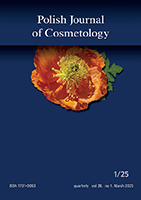search by
Copyright @ Pol J CosmetolComparison of the effectiveness of essential oils bactericidal activity against standard strains of Gram-positive and Gram-negative bacteriaMarcelina Jureczko, Aleksandra Ziembińska-Buczyńska Katedra Biotechnologii Środowiskowej, Wydział Inżynierii Środowiska i Energetyki, Politechnika Śląska w Gliwicach Summary Introduction. Overuse of antibiotics is the reason why a large number of these compounds are no longer effective against pathogenic bacteria. That is why scientists are looking for alternative bactericidal substances. Some of essential oils could be taken into consideration as substances with a wide range of biocidal effects. Aim. Comparison of the effectiveness of selected essential oils bactericidal activity against standard strains of Gram-positive and Gram-negative bacteria. Materials and methods. 15 different essential oils were used in the experiment: Illicum verum, Citrus medica limonum, Melaleuca alternifolia, Eucalyptus globulus, Juniperus communis Fruit, Abies sybrica, Lavendula angustifolia, Citrus aurantifolia, Citrus nobilis Peel, Mentha piperita, Rosmarinum officinalis, Pinus sylvestris Leaf, Salvia sclarea, Thymus vulgaris, Citrus aurantium dulcis and tested bactericidal effects against two different strains: Escherichia coli (strain PCM 2209), which belongs to the group of Gram-negative bacteria, and Bacillus subtilis (strain PCM 486), which is a Gram-positive bacterium. Bactericidal effectiveness has been tested with radial diffusion method. Results. The experiment has shown that essential oils were more effective against representative Gram-positive bacteria. Illicum verum, Lavendula angustifolia, Mentha piperita, Salvia sclarea and Thymus vulgaris oils showed activity against both strains. Melaleuca alternifolia, Abies sybrica, Citrus aurantifolia, Citrus aurantium dulcis and Rosmarinum officinalis Leaf oils were bactericidal against Bacillus subtilis, and Citrus medica limonum and Juniperus communis Fruit oils against Escherichia coli. Only Eucalyptus globulus, Citrus nobilis Peel and Pinus sylvestris Leaf oils did not show any antibacterial activity. Conclusion. 1. Essential oils could be taken into consideration as an alternative to antibiotics. 2. Gram-positive bacteria are more sensitive to the effects of substances from the environment than Gram-negative bacteria. 3. Checking the chemical composition of essential oils can be useful to predict to some extent its bactericidal efficacy, because essential oils effectiveness is strongly connected with it. Key words: bactericidal influence, essential oils, disc diffusion method |




